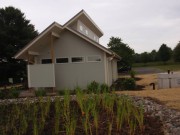PA’s Legislative Budget and Finance Committee Recommends Odor Management Plans
Last year, the Pennsylvania General Assembly passed House Resolution 2016-60, directing the Legislative Budget and Finance Committee to review the state’s regulations for the use of biosolids via land application. In July of 2017, this review was completed, including an evaluation of how biosolids are currently used, the associated costs, and the potential alternatives. The resolution also required review of the Pennsylvania Department of Environmental Protections’ implementation of the biosolid land application program. The title of the report is “PA’s Program for Beneficial Use of Biosolids (Sewage Sludge) by Land Application.”
One of the notable points raised by the report is that Pennsylvania sends more of its biosolids to landfills than most other states. Whereas Pennsylvania sends approximately 46 percent of its biosolids to landfills, others send only about 20 percent to landfills. Additionally, while Pennsylvania uses about 38 percent of its biosolids for land application, other states use almost 60 percent of their own biosolids for the same purpose.
This is important because the report identifies land application of biosolids to be the least expensive method of biosolids management. A 2007 report from the Center for Rural Pennsylvania is cited identifying the average cost for large-scale land application of biosolids to be $145 per dry ton; the other two leading methods for biosolid disposal, landfills and incineration, cost an average of $260 and $290 per dry ton respectively.
The Legislative Budget and Finance Committee report goes on to describe the other benefits of biosolid land applications – namely, their role in reducing fertilizer costs for farmers. The report states that the nitrogen, phosphorous, and other various micronutrients contained in most biosolids are beneficial to plant growth, while also reducing surface runoff and erosion and improving the capacity of the treated soil to hold water and nutrients. Some biosolids have also been used to assist in the reclamation of surface mines in Dauphin, Centre, Clearfield, and Schuylkill Counties.
Continuing, the report addresses the protections for biosolid recycling under the Right to Farm Act, citing a December 2015 Supreme Court decision to regard the use of biosolid fertilizer as “normal agricultural practice”. The report also mentions the public’s primary concern about biosolid land application in this manner to be the offensive odors they produce.
The report continues with information on how technologies are still developing to use and process biosolids more effectively, including the potential for biosolids to be used to produce methane fuel. Another noted technology cited in the report is the OmniProcessor, demonstrated at a Seattle test facility, which could use some biosolids to produce “…drinkable water, electricity, and a pathogen-free ash”. Another alternative is the use of dried biosolids in coal fired power plants and cement plants. The report also mentions advances in digestion and thermal hydrolysis.
Finally, the report makes its recommendation regarding its findings, stating that the “DEP should modify its General Operating Permit requirements to require biosolids generators to develop odor management plans”. This strategy is designed to address the odor problem of land-applications for biosolids, which the report cites as “…the biggest threat to the beneficial use of biosolids”. It finishes by saying that, should DEP inspectors be made aware of a valid odor complaints, then they should “…take appropriate enforcement actions if the odor management plan is not being properly implemented”.
WBE
PA Certified Woman Business Enterprise
WOSB
FEDERALLY CERTIFIED WOMEN-OWNED SMALL BUSINESS

Nutrient Management Planning Specialist
Odor Management Planning Specialist
Follow Garvey Resources, Inc. on Facebook
Keep informed about the latest biosolids news and trends by following Diane Garvey's Biosolids Blog.
Diane's most recent post is entitled, "The Latest Information About Covid-19 as It Relates to Biosolids"
Biosolids Blog
News & Events
Diane Garvey was recently awarded the David A. Long Memorial Educational Service Award by the Pennsylvania Water Environment Association!
This award was established in honor of Dr. David A. Long in recognition of his lifelong service and dedication toward the education and training of wastewater and water treatment plant operators and environmental professionals.
This award is presented to individuals who distinguish themselves through their efforts and contributions to the education of water quality professionals.
DC Water has launched its new branded biosolids product: BLOOM. And you can learn about this project at the new website:
For more information on any of the above topics, please contact Diane Garvey at diane@garveyresources.com or call 215-362-4444.
Garvey Resources was a partner in the development of the Rodale Institute's Water Purification ECO-Center. Read about it on our Biosolids Blog.
Contact Us or Make an Appointment
We invite you to call or e-mail us today to discuss optimizing your biosolids program.
For answers to your questions or to schedule an appointment, please call:
215-362-4444
Or send us an email at info@garveyresources.com.


